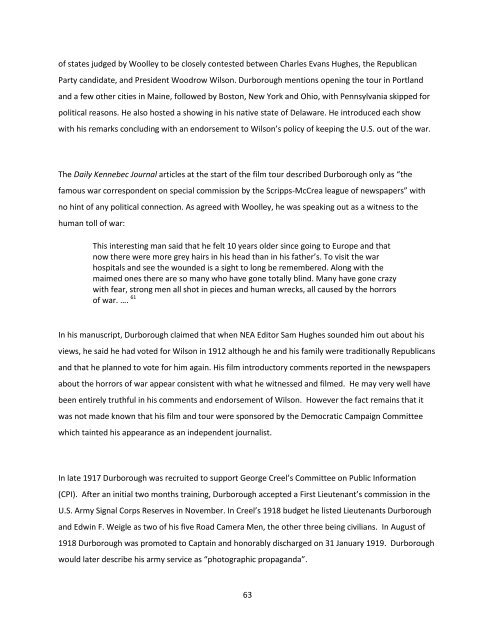"On the Firing Line with the Germans" Film Annotations (2017)
Film annotations, describing the making of Wilbur H. Durborough's World War I feature film "On the Firing Line with the Germans (USA, 1915) by authors Cooper C. Graham, Ron van Dopperen and James W. Castellan (April 2017). For more information visit our weblog http://shootingthegreatwar.blogspot.nl The movie can be watched on our YouTube channel: https://youtu.be/958QR_Cdg5U
Film annotations, describing the making of Wilbur H. Durborough's World War I feature film "On the Firing Line with the Germans (USA, 1915) by authors Cooper C. Graham, Ron van Dopperen and James W. Castellan (April 2017).
For more information visit our weblog http://shootingthegreatwar.blogspot.nl
The movie can be watched on our YouTube channel:
https://youtu.be/958QR_Cdg5U
Create successful ePaper yourself
Turn your PDF publications into a flip-book with our unique Google optimized e-Paper software.
of states judged by Woolley to be closely contested between Charles Evans Hughes, <strong>the</strong> Republican<br />
Party candidate, and President Woodrow Wilson. Durborough mentions opening <strong>the</strong> tour in Portland<br />
and a few o<strong>the</strong>r cities in Maine, followed by Boston, New York and Ohio, <strong>with</strong> Pennsylvania skipped for<br />
political reasons. He also hosted a showing in his native state of Delaware. He introduced each show<br />
<strong>with</strong> his remarks concluding <strong>with</strong> an endorsement to Wilson’s policy of keeping <strong>the</strong> U.S. out of <strong>the</strong> war.<br />
The Daily Kennebec Journal articles at <strong>the</strong> start of <strong>the</strong> film tour described Durborough only as “<strong>the</strong><br />
famous war correspondent on special commission by <strong>the</strong> Scripps-McCrea league of newspapers” <strong>with</strong><br />
no hint of any political connection. As agreed <strong>with</strong> Woolley, he was speaking out as a witness to <strong>the</strong><br />
human toll of war:<br />
This interesting man said that he felt 10 years older since going to Europe and that<br />
now <strong>the</strong>re were more grey hairs in his head than in his fa<strong>the</strong>r’s. To visit <strong>the</strong> war<br />
hospitals and see <strong>the</strong> wounded is a sight to long be remembered. Along <strong>with</strong> <strong>the</strong><br />
maimed ones <strong>the</strong>re are so many who have gone totally blind. Many have gone crazy<br />
<strong>with</strong> fear, strong men all shot in pieces and human wrecks, all caused by <strong>the</strong> horrors<br />
of war. …. 61<br />
In his manuscript, Durborough claimed that when NEA Editor Sam Hughes sounded him out about his<br />
views, he said he had voted for Wilson in 1912 although he and his family were traditionally Republicans<br />
and that he planned to vote for him again. His film introductory comments reported in <strong>the</strong> newspapers<br />
about <strong>the</strong> horrors of war appear consistent <strong>with</strong> what he witnessed and filmed. He may very well have<br />
been entirely truthful in his comments and endorsement of Wilson. However <strong>the</strong> fact remains that it<br />
was not made known that his film and tour were sponsored by <strong>the</strong> Democratic Campaign Committee<br />
which tainted his appearance as an independent journalist.<br />
In late 1917 Durborough was recruited to support George Creel’s Committee on Public Information<br />
(CPI). After an initial two months training, Durborough accepted a First Lieutenant’s commission in <strong>the</strong><br />
U.S. Army Signal Corps Reserves in November. In Creel’s 1918 budget he listed Lieutenants Durborough<br />
and Edwin F. Weigle as two of his five Road Camera Men, <strong>the</strong> o<strong>the</strong>r three being civilians. In August of<br />
1918 Durborough was promoted to Captain and honorably discharged on 31 January 1919. Durborough<br />
would later describe his army service as “photographic propaganda”.<br />
63



